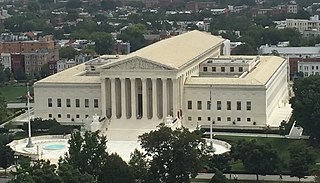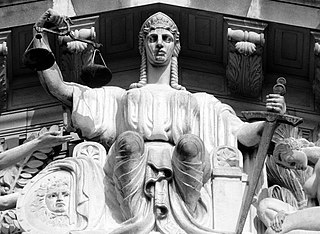Related Research Articles

An appellate court, commonly called a court of appeal(s), appeal court, court of second instance or second instance court, is any court of law that is empowered to hear an appeal of a trial court or other lower tribunal. In much of the world, court systems are divided into at least three levels: the trial court, which initially hears cases and reviews evidence and testimony to determine the facts of the case; at least one intermediate appellate court; and a supreme court (or court of last resort) which primarily reviews the decisions of the intermediate courts, often on a discretionary basis. A particular court system's supreme court is its highest appellate court. Appellate courts nationwide can operate under varying rules.
Precedent or stare decisis is a principle or rule established in a previous legal case relevant to a court or other tribunal when deciding subsequent cases with similar issues or facts. Common-law legal systems often view precedent as binding or persuasive, while civil law systems do not. Common-law systems aim for similar facts to yield similar and predictable outcomes, and observing precedent when making decisions is the mechanism to achieve that goal. Common-law precedent is a third kind of law, on equal footing with statutory law and subordinate legislation in UK parlance – or regulatory law. The principle by which judges are bound to precedents is known as stare decisis.

Article Three of the United States Constitution establishes the judicial branch of the U.S. federal government. Under Article Three, the judicial branch consists of the Supreme Court of the United States, as well as lower courts created by Congress. Article Three empowers the courts to handle cases or controversies arising under federal law, as well as other enumerated areas. Article Three also defines treason.
Due process of law is application by the state of all legal rules and principles pertaining to a case so all legal rights that are owed to a person are respected. Due process balances the power of law of the land and protects the individual person from it. When a government harms a person without following the exact course of the law, this constitutes a due process violation, which offends the rule of law.
A lawsuit is a proceeding by one or more parties against one or more parties in a civil court of law. The archaic term "suit in law" is found in only a small number of laws still in effect today. The term "lawsuit" is used with respect to a civil action brought by a plaintiff who requests a legal remedy or equitable remedy from a court. The defendant is required to respond to the plaintiff's complaint or else risk default judgment. If the plaintiff is successful, judgment is entered in favor of the defendant. A variety of court orders may be issued in connection with or as part of the judgment to enforce a right, award damages or restitution, or impose a temporary or permanent injunction to prevent an act or compel an act. A declaratory judgment may be issued to prevent future legal disputes.
In law, certiorari is a court process to seek judicial review of a decision of a lower court or government agency. Certiorari comes from the name of an English prerogative writ, issued by a superior court to direct that the record of the lower court be sent to the superior court for review. The term is Latin for "to be made more certain", and comes from the opening line of such writs, which traditionally began with the Latin words "Certiorari volumus...".
The federal judiciary of the United States is one of the three branches of the federal government of the United States organized under the United States Constitution and laws of the federal government. The U.S. federal judiciary consists primarily of the U.S. Supreme Court, the U.S. Courts of Appeals, and the U.S. District Courts. It also includes a variety of other lesser federal tribunals.
Burford v. Sun Oil Co., 319 U.S. 315 (1943), was a United States Supreme Court case in which the Court created a new doctrine of abstention.

In the United States, judicial review is the legal power of a court to determine if a statute, treaty, or administrative regulation contradicts or violates the provisions of existing law, a State Constitution, or ultimately the United States Constitution. While the U.S. Constitution does not explicitly define the power of judicial review, the authority for judicial review in the United States has been inferred from the structure, provisions, and history of the Constitution.

Anisminic Ltd v Foreign Compensation Commission [1969] 2 AC 147 is a UK constitutional law case from the House of Lords in English administrative law. It established the "collateral fact doctrine", that any error of law made by a public body will make its decision a nullity and that a statutory exclusion clause does not deprive the courts from their jurisdiction in judicial review unless it expressly states this.

Judicial review is a process under which a government's executive, legislative, or administrative actions are subject to review by the judiciary. In a judicial review, a court may invalidate laws, acts, or governmental actions that are incompatible with a higher authority. For example, an executive decision may be invalidated for being unlawful, or a statute may be invalidated for violating the terms of a constitution. Judicial review is one of the checks and balances in the separation of powers—the power of the judiciary to supervise the legislative and executive branches when the latter exceed their authority. The doctrine varies between jurisdictions, so the procedure and scope of judicial review may differ between and within countries.

Errors as to precedent facts, sometimes called jurisdictional facts, in Singapore administrative law are errors committed by public authorities concerning facts that must objectively exist or not exist before the authorities have the power to take actions or make decisions under legislation. If an error concerning a precedent fact is made, the statutory power has not been exercised lawfully and may be quashed by the High Court if judicial review is applied for by an aggrieved person. The willingness of the Court to review such errors of fact is an exception to the general rule that the Court only reviews errors of law.

Administrative law in Singapore is a branch of public law that is concerned with the control of governmental powers as exercised through its various administrative agencies. Administrative law requires administrators – ministers, civil servants and public authorities – to act fairly, reasonably and in accordance with the law. Singapore administrative law is largely based on English administrative law, which the nation inherited at independence in 1965.

Illegality is one of the three broad headings of judicial review of administrative action in Singapore, the others being irrationality and procedural impropriety. To avoid acting illegally, an administrative body or public authority must correctly understand the law regulating its power to act and to make decisions, and give effect to it.

Exclusion of judicial review has been attempted by the Parliament of Singapore to protect the exercise of executive power. Typically, this has been done though the insertion of finality or total ouster clauses into Acts of Parliament, or by wording powers conferred by Acts on decision-makers subjectively. Finality clauses are generally viewed restrictively by courts in the United Kingdom. The courts there have taken the view that such clauses are, subject to some exceptions, not effective in denying or restricting the extent to which the courts are able to exercise judicial review. In contrast, Singapore cases suggest that ouster clauses cannot prevent the High Court from exercising supervisory jurisdiction over the exercise of executive power where authorities have committed jurisdictional errors of law, but are effective against non-jurisdictional errors of law.
In law, an appeal is the process in which cases are reviewed by a higher authority, where parties request a formal change to an official decision. Appeals function both as a process for error correction as well as a process of clarifying and interpreting law. Although appellate courts have existed for thousands of years, common law countries did not incorporate an affirmative right to appeal into their jurisprudence until the 19th century.

An ouster clause or privative clause is, in countries with common law legal systems, a clause or provision included in a piece of legislation by a legislative body to exclude judicial review of acts and decisions of the executive by stripping the courts of their supervisory judicial function. According to the doctrine of the separation of powers, one of the important functions of the judiciary is to keep the executive in check by ensuring that its acts comply with the law, including, where applicable, the constitution. Ouster clauses prevent courts from carrying out this function, but may be justified on the ground that they preserve the powers of the executive and promote the finality of its acts and decisions.
Jurisdictional error is a concept in administrative law, particularly in the UK and Australia. Jurisdiction is the "authority to decide", and a jurisdictional error occurs when the extent of that authority is misconceived. Decisions affected by jurisdictional error can be quashed by judicial review. Examples of jurisdictional errors include asking a wrong question, ignoring relevant material, relying on irrelevant material, and breaching natural justice.

Craig v South Australia is a decision of the High Court of Australia.

Kirk v Industrial Relations Commission of New South Wales is a landmark decision of the High Court of Australia that dealt with the constitutional limits on State Courts' powers and the doctrine of jurisdictional error.